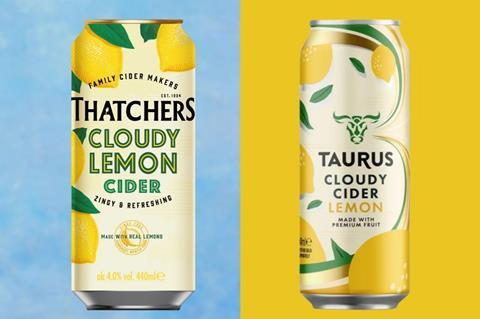
In January, in Thatchers v Aldi [2025] EWCA Civ 5, the Court of Appeal found that Aldi Stores Ltd’s (Aldi) Taurus Cloudy Lemon Cider infringed Thatchers Cider Company Ltd’s (Thatchers) registered trade mark. That decision marked a turning point for brand owners seeking to challenge supermarket lookalikes. With the Supreme Court’s endorsement, the legal position has been further cemented in favour of brand protection.

Background
The dispute began when Thatchers accused Aldi of infringing its trade mark with Aldi’s Taurus Cloudy Lemon Cider. The product had a striking resemblance to Thatchers’ Cloudy Lemon Cider, particularly in terms of packaging, colour scheme and overall presentation. Initially, the Intellectual Property Enterprise Court (IPEC) ruled in Aldi’s favour, finding no infringement or passing off. Thatchers appealed.
Court of Appeal decision
The Court of Appeal overturned the IPEC decision, holding that Aldi had taken unfair advantage of Thatchers’ trade mark.
Thatchers appeal was made in relation to section 10(3) of the Trademarks Act 1994. Thatchers argued that Aldi’s Taurus Cloudy Lemon Cider packaging was very similar to Thatchers’ Cloudy Lemon Cider and took unfair advantage, or caused detriment to, the distinctive character and repute of the trade mark, without due cause.
The Court of Appeal only needed to consider two of the nine legal conditions for infringement under section 10(3) – (a) whether Aldi’s product created a link in the consumer’s mind with Thatchers; and (b) whether this caused unfair advantage or harm to Thatchers’ brand.
Aldi tried to defend itself under section 11(2)(b) of the act, claiming its packaging was descriptive and used honestly. However, the court rejected this, stating that Aldi’s actions amounted to unfair competition and were not in line with honest commercial practices.
In his judgment, Lord Justice Arnold ruled in favour of Thatchers. He found that: (a) Aldi had intended its packaging to remind consumers of Thatchers’ cider, suggesting that it was a cheap alternative; and (b) that Aldi benefited unfairly from Thatchers’ brand reputation and marketing efforts, rather than competing fairly.
Supreme Court appeal application
Aldi sought to overturn the Court of Appeal’s decision, which had found that Aldi’s use of its ‘sign’ (the packaging of its Taurus Cloudy Lemon Cider to include the graphics on the cans and the cardboard four-can pack) took unfair advantage of the reputation of Thatchers’ trade mark.
Aldi sought permission to appeal on the grounds that the Court of Appeal erred in its interpretation and application of section 10(3). Specifically, Aldi contended that the court improperly expanded the scope of trade mark infringement by effectively creating a new wrong of ‘mere copying’, which is not supported by the statutory framework. Aldi also argued that the court misapplied section 11(2)(b) of the act by failing to properly consider Aldi’s right to use descriptive indications concerning the characteristics of its product. The Supreme Court refused Aldi’s permission to appeal on 4 June 2025.
In doing so, the court reinforced the importance of the holistic assessment of a sign’s impact on consumer perception, rejecting Aldi’s argument that the similarities were merely descriptive or non-distinctive. The decision of the court also upheld the finding that Aldi’s conduct did not meet the standard of ‘honest practices’ in industrial or commercial matters.
What does this mean for brand owners and retailers?
This final decision is a resounding endorsement of the rights of brand owners and a warning to retailers. The Supreme Court’s decision confirms that:
- Intentional imitation that seeks to evoke a branded product in the minds of consumers can constitute trade mark infringement.
- Unfair advantage may be found even where there is no direct confusion, provided there is a link, and a reputational benefit derived from the brand owner’s investment.
- Honest practices defences will be closely examined, particularly where the commercial strategy appears to trade on the goodwill of established brands.
Welcome finality
The Supreme Court’s decision brings welcome finality to a case that has been closely watched across the retail and legal sectors. For brand owners, it is a vindication of robust trade mark protection strategies and a reminder of the value of registering not only a word mark or a logo but distinctive packaging and design elements of a product.
For retailers, particularly those operating in the discount sector or with their own branded products, the judgment is a clear signal that the courts will not tolerate retailers taking unfair advantage of distinctive marks or causing detriment to the repute of such marks through lookalike packaging.
The importance of evidence of consumer perception cannot be overstated. These materials played a key role in the Court of Appeal decision and should be recorded wherever possible.
Dan Fletcher is a trainee solicitor in the intellectual property team at Birketts, Cambridge































No comments yet